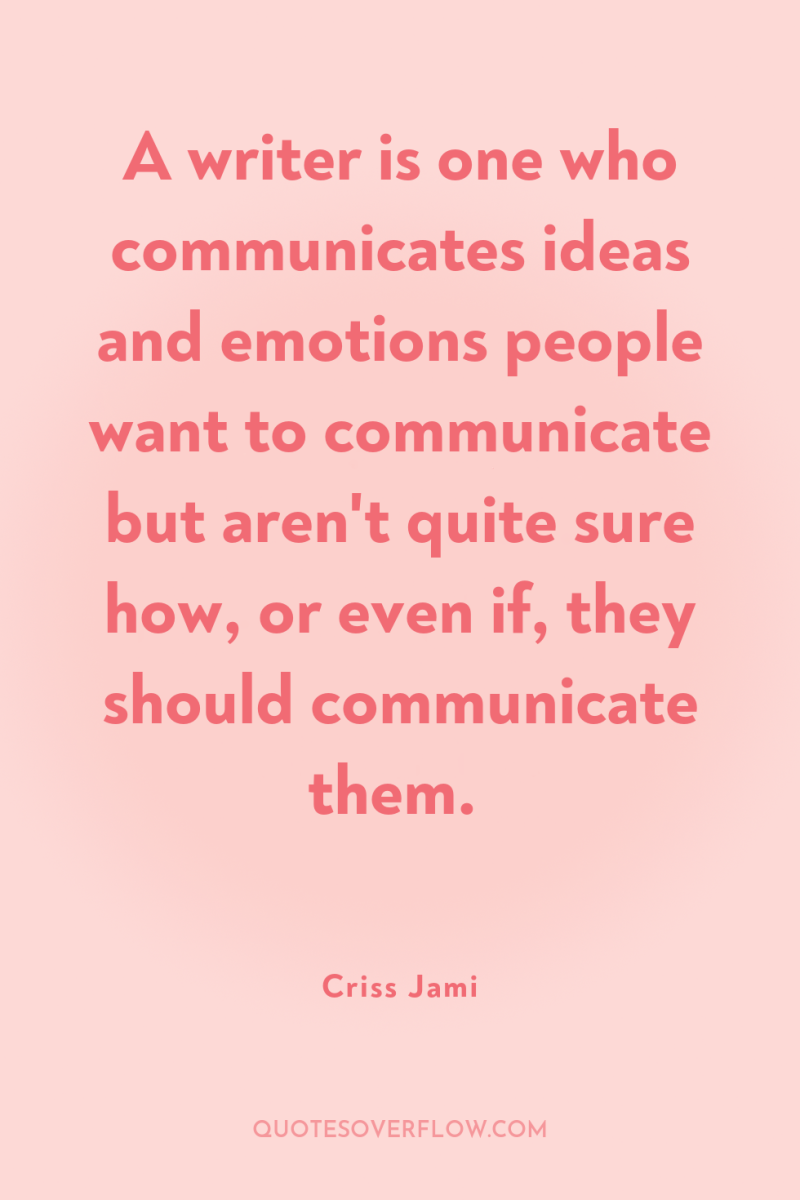1
When you give yourself permission to communicate what matters to you in every situation you will have peace despite rejection or disapproval. Putting a voice to your soul helps you to let go of the negative energy of fear and regret.Shannon L. Alder

2
A writer is one who communicates ideas and emotions people want to communicate but aren't quite sure how, or even if, they should communicate them.Criss Jami

3
We seldom learn much from someone with whom we agree.Mokokoma Mokhonoana

4
Fighting for peace, is like f***ing for chastityStephen King

5
Whenever they are condemning weaves or breast implants, some people speak so passionately that their false teeth almost fall out.Mokokoma Mokhonoana
6
Don't allow anyone to hold you back from expressing your feelings. Maybe you just can't stand a chance of losing some friends, but if you must be truly you, you must be you! Nothing else!Michael Bassey Johnson
7
If you can't set a better example for progress, don't show disapproval against the worse tradition!Israelmore Ayivor
8
Please, be sure to display your stickers, so that I won’t misplace any of you. I lost a few people, while crossing the street, during the last tour. I didn’t think it was a big deal, but apparently, the boss frowns upon that sort of thing.Jason Medina
9
People who take you for granted would be mad at those who regard you as something.Michael Bassey Johnson
10
Moral indignation is jealousy with a halo.H.G. Wells
11
To be unable to bear disapproval was an unworthy weakness. But in her case it came nowise of the pride which blame stirs to resentment, but altogether of the self-depreciation which disapproval rouses to yet greater dispiriting. Praise was to her a precious thing, in part because it made her feel as if she could go on; blame, a misery, in part because it made her feel as if all was of no use, she never could do anything right. She had not yet learned that the right is the right, come of praise or blame what may. The right will produce more right and be its own reward--in the end a reward altogether infinite, for God will meet it with what is deeper than all right, namely, perfect love.George MacDonald
12
They wouldn't beat him up. They wouldn't break his ribs. He knew that. But they had other ways of breaking him - with silence, with disappointment, with disapproval.David Levithan
13
Hypercritical, Shaming ParentsHypercritical and shaming parents send the same message to their children as perfectionistic parents do - that they are never good enough. Parents often deliberately shame their children into minding them without realizing the disruptive impact shame can have on a child's sense of self. Statements such as "You should be ashamed of yourself" or "Shame on you" are obvious examples. Yet these types of overtly shaming statements are actually easier for the child to defend against than are more subtle forms of shaming, such as contempt, humiliation, and public shaming. There are many ways that parents shame their children. These include belittling, blaming, contempt, humiliation, and disabling expectations.- B E L I T T L I N G. Comments such as "You're too old to want to be held" or "You're just a cry-baby" are horribly humiliating to a child. When a parent makes a negative comparison between his or her child and another, such as "Why can't you act like Jenny? See how she sits quietly while her mother is talking, " it is not only humiliating but teaches a child to always compare himself or herself with peers and find himself or herself deficient by comparison.- B L A M I N G. When a child makes a mistake, such as breaking a vase while rough-housing, he or she needs to take responsibility. But many parents go way beyond teaching a lesson by blaming and berating the child: "You stupid idiot! Do you think money grows on trees? I don't have money to buy new vases! " The only thing this accomplishes is shaming the child to such an extent that he or she cannot find a way to walk away from the situation with his or her head held high.- C O N T E M P T. Expressions of disgust or contempt communicate absolute rejection. The look of contempt (often a sneer or a raised upper lip), especially from someone who is significant to a child, can make him or her feel disgusting or offensive. When I was a child, my mother had an extremely negative attitude toward me. Much of the time she either looked at me with the kind of expectant expression that said, "What are you up to now?" or with a look of disapproval or disgust over what I had already done. These looks were extremely shaming to me, causing me to feel that there was something terribly wrong with me.- H U M I L I A T I O N. There are many ways a parent can humiliate a child, such as making him or her wear clothes that have become dirty. But as Gershen Kaufman stated in his book Shame: The Power of Caring, "There is no more humiliating experience than to have another person who is clearly the stronger and more powerful take advantage of that power and give us a beating." I can personally attest to this. In addition to shaming me with her contemptuous looks, my mother often punished me by hitting me with the branch of a tree, and she often did this outside, in front of the neighbors. The humiliation I felt was like a deep wound to my soul.- D I S A B L I N G EXPECTATIONS. Parents who have an inordinate need to have their child excel at a particular activity or skill are likely to behave in ways that pressure the child to do more and more. According to Kaufman, when a child becomes aware of the real possibility of failing to meet parental expectations, he or she often experiences a binding self-consciousness. This self-consciousness - the painful watching of oneself - is very disabling. When something is expected of us in this way, attaining the goal is made harder, if not impossible. Yet another way that parents induce shame in their children is by communicating to them that they are a disappointment to them. Such messages as "I can't believe you could do such a thing" or "I am deeply disappointed in you" accompanied by a disapproving tone of voice and facial expression can crush a child's spirit. .Beverly Engel